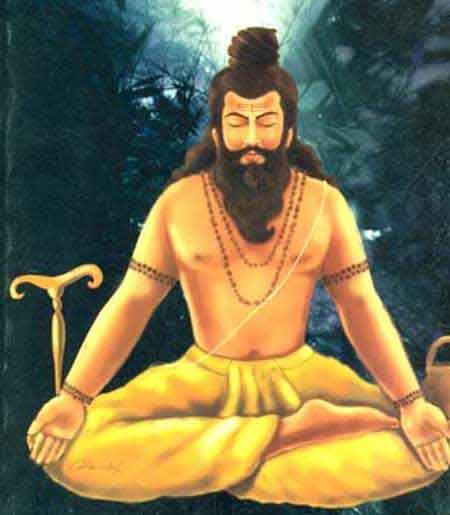Vishwamitra nadi sukta consists of thirteen stanzas in the Rig Veda III.33 addressed to two rivers. It is in the form of a dialogue. The dialogue hymns in Rig Veda are known as ahyana hymns or ballads. Vishwamitra Nadi Sukta is dialogue between Vishwamitra, a seer of Rig Veda III and the two rivers – Vipas (Beas) and Sutudri (Sutlej) in Punjab. It took place at the confluence of these two rivers, which were flooded when the rishi wanted to cross it.
According to Sayana, commentator on Rig Veda, Sage Vishwamitra was the purohita (chief priest) of King Sudas, son of Pijavana, and as a priest, he received a good amount of wealth as dashina with which he came to the confluence of the two rivers.
It is also suggested that the Bharata communities were successful in their expedition and they and their priest were confronted at the confluence with the problem of successful and safe crossing, as these two rivers, being urged by Indra, were flowing with a great mass of water, swelling into waves, like two beautiful mother cows, each licking her calf, or like a team of horses seeking a rapid course.
Vishwamitra keen on crossing the rivers addressed them with these words – I have come to the most motherly stream Sutudri and to the broad and lovely Vipasa.
The two rivers replied – Swelling with water, we are moving forward through the common bed prepared by Indra to the ocean. Our speedy stream cannot be checked. What do you desire that you repeatedly call upon us.
Vishwamitra replied – O holy rivers, please stop for a moment, inclining to my gentle words, I, the son of Kushika, desire protection and hence I invoke you two with a great prayer.
The rivers replied – Indra, who holds the vajra (bolt) in his hands, has dug out our course. He has slain Vritra, the encompassing fence of the rivers. Savita, who has beautiful hands, has led us forward. Broad with waters, as we are, we move forward at the command of Indra.
Vishwamitra understood the mind of the rivers and their obligation to Indra, and accordingly, in the same tune, he started praising Indra – The heroic deed of Indra, his slaying of Ahi (Vritra), deserves to be praised always in various ways. He slew the obstructors (asuras) and let loose the pent up waters with his vajra. And thus the waters pining for an outlet flow forth.
With the praise of Indra the rivers were pleased and knowing that the words of the seers can give them immortal glory, the rivers replied – O singer, please do not forget these words of praise which the future generations will proclaim with approbation. Be tender towards us in your hymns and do not humiliate us amongst them. We salute you.
Vishwamitra realized that the rivers were now ready to assist him and so he spoke to them with sincere concern, in loving words – O sisters, listen well to this singer. He has come to you from afar with wagons (bullock carts) and chariots. Please bend down well, with your streams flowing under the axles of our carts and chariots, enabling them to ford.
With these sincere, plaing and unambiguous words of appeal, the rivers were please to offer him a safe passage and said to him – we listen to your words. You have come from afar with wagons and chariots. One of them continued to tell him, I shall bend myself to you as a wet nurse swelling with milk will bend to a child, while the other said, I shall go down to you, as a maiden does for her lover.
Vishwamitra responded – O dear rivers, when the Bharatas, the warlike band, inspired and urged by Indra, would have crossed you, may your on-rushing streams gush certainly forward (as before). I seek the favor of you two, the worshipful ones.
Thus the difficulty was over the river crossing was safely accomplished and Vishwamitra declared: Bharatas, the war loving ones have crossed now. The singer has enjoyed favor of the rivers. O rivers, swell on, being beautiful and bringers of nourishment. Fill up you beds and roll on swiftly.
Thus, from the biographical point of view, this hymn records an important event in the life of Vishwamitra and presents his sweet and firm persuasive language and his sweet associations with Bharatas.
In the last stanza, the seer has crossed the river, and it is likely that the sage refers to a lingering cart of his caravan with concern as follows – May your waves hold up the yolk pins, o waters. Spare the harness. Let not the two innocent bulls which have done no wrong go to void (swept away).
This 13 stanzas has evoked divergent views about its purpose. It is considered as a spell for crossing rivers. From the literary point of view, it may be note that the hymn contains figures of speech like simile and metaphors. The characters are well drawn. The dialogue is lively and effective. There is poetry of moving emotions with well-chosen words.
Source – Encyclopedia of Hinduism Rupa-IHRF Volume XI page 414-15

